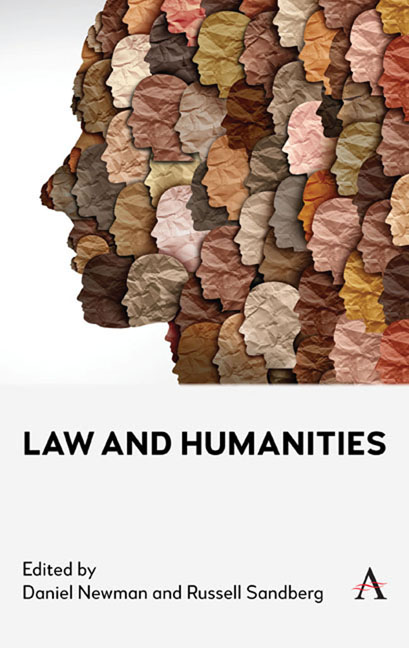Book contents
- Frontmatter
- Contents
- Preface
- List of Contributors
- Chapter One Introducing Law and Humanities
- Chapter Two Law and Archaeology
- Chapter Three Law and Comics/Graphic Justice
- Chapter Four Law and Film
- Chapter Five Law and Geography
- Chapter Six Law and History
- Chapter Seven Law and Literature
- Chapter Eight Law and Philosophy
- Chapter Nine Law and Popular Music
- Chapter Ten Law and Religion
- Chapter Eleven Law and Television
- Chapter Twelve Law and Theatre
- Chapter Thirteen Law and Theology
- Chapter Fourteen Law and Video Games
- Chapter Fifteen Conclusion: Subverting the Law and Humanities Canon
- Index
Chapter Ten - Law and Religion
Published online by Cambridge University Press: 27 March 2024
- Frontmatter
- Contents
- Preface
- List of Contributors
- Chapter One Introducing Law and Humanities
- Chapter Two Law and Archaeology
- Chapter Three Law and Comics/Graphic Justice
- Chapter Four Law and Film
- Chapter Five Law and Geography
- Chapter Six Law and History
- Chapter Seven Law and Literature
- Chapter Eight Law and Philosophy
- Chapter Nine Law and Popular Music
- Chapter Ten Law and Religion
- Chapter Eleven Law and Television
- Chapter Twelve Law and Theatre
- Chapter Thirteen Law and Theology
- Chapter Fourteen Law and Video Games
- Chapter Fifteen Conclusion: Subverting the Law and Humanities Canon
- Index
Summary
Introduction: An English and Welsh Case Study
The interaction between law and religion differs considerably across time and space. At one extreme, there are theocracies where the religion is law and societies where religious hands shape the laws of the land. There are states where a religion or a particular religious group is afforded a protected position, be it by constitutional recognition of one religion or by the existence of concordats or treaties with them endowing upon the religion equal status to the state. Other societies bestow legal status with resulting benefits and burdens on to those that register or come within particular definitions. Others still provide for freedom of religion and belief, with protections being extended to non-religious world views and often expressed in international agreements. Some states see their role as facilitating and, where needed, regulating the religious marketplace and others see the role of the state as being neutral and/or taking a secular stance (two approaches that are not identical and not completely compatible). These are, of course, ideal types. These models rarely, if ever, exist in their idealised perfect form. In many places in many eras, several of these characteristics exist and interact uneasily. This is often the result of historical religion-state relationships failing to keep up with wider political, social and legal change. The interaction between law and religion is invariably in flux – always contestable, ever changing often in subtle sometimes unseen ways.
This chapter focuses squarely on the study of the interaction between law and religion in England and Wales in the early twenty-first century. Perhaps as a result of a lack of a single document amounting to a written constitution, a wide number and diverse variety of the ideal types described above apply in England and Wales today; often in non-ideal ways. For much of its history, English laws have been shaped by clerical hands and this continues to some extent today with bishops of the Church of England sitting in the House of Lords and representatives of that church having a special protected position on the local bodies that determine how religion is taught in schools and the laws on collective worship in schools. Education is but one example of a social function originally discharged by religions and enforced by church courts where the state has only relatively recently been active and this limits any attempt by the state to monopolise.
- Type
- Chapter
- Information
- Law and Humanities , pp. 159 - 174Publisher: Anthem PressPrint publication year: 2024



